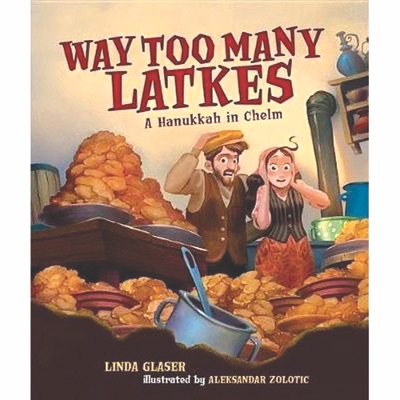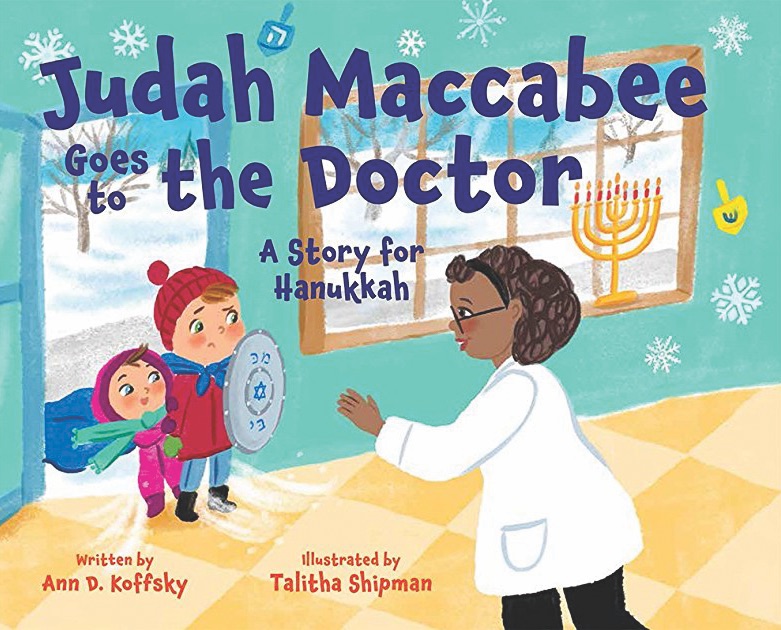
Many new Hanukkah-themed illustrated children’s books are full of wit and surprises this year. Some books take on the holiday with a bit of a twist, while others comfortably rely on traditional stories, newly told. All the recommended choices here celebrate the holiday with humor — from a fractured fairy tale and a reimagining of the beloved Chelm stories, to modern-day stories of multicultural families and, surprisingly, even the vaccine controversy.
“Little Red Ruthie: A Hanukkah Tale” by Gloria Koster. Illustrated by Sue Eastland. Albert Whitman & Co.

Spunky Little Red Ruthie wears a puffy, red-hooded parka on her way to Bubbe Basha’s house on the other side of the forest. It’s snowing as she kisses her mother goodbye and leaves her comfortable, modern home with her basket filled with sour cream and applesauce. When a frightening wolf appears on the path and threatens, “Little girl … I am going to eat you up!” Ruthie stays strong and brave. Like the Maccabees of old, she “would stand up to her enemy too.” Ruthie meets up with the wolf again at Bubbe’s house and cleverly tricks him into delaying his evil plan by telling him the story of Hanukkah and frying up lots of latkes. The hungry wolf overindulges and gets too full for another bite of anything else as he is escorted out the door. The humorous illustrations enhance the well-told tale. A useful latke recipe is included.
“Way Too Many Latkes: A Hanukkah in Chelm” by Linda Glaser. Illustrated by Aleksandar Zolotic. Kar-Ben.

Chelm stories are supposed to be funny, and this one will inspire giggling in any child, particularly if the reader hams up the character voices. We learn that Faigel makes the best latkes in all of Chelm, but unfortunately for everyone else, she makes only enough for herself and Shmuel, her hapless husband. One year, she inexplicably forgets the recipe and her husband must go to the rabbi (“the wisest man in Chelm”) to ask how many potatoes need to be used. The rabbi tells him to “use them all” without realizing that Shmuel and Faigel’s larder is full. The cycle is repeated with the other ingredients (eggs, onions) and silliness ensues. The comic-style illustrations capture the kitchen mayhem, idealized shtetl life and the over-the-top storyline with amusing flair. Of course, the whole town gets to partake in the deliciousness by the story’s end.
“The Missing Letters: A Dreidel Story” by Renee Londner. Illustrated by Iryna Bodnaruk. Kar-Ben.

Children will be delighted to find out that dreidels come alive at night at the dreidel factory and talk to one another. Actually, they like to argue about the fairness of the dreidel game rules. The nuns are jealous of the gimels because … who wants to get a nun, anyway? But the shins have the most legitimate complaint, since people have to add to the pot when the dreidel falls on their letter. The heys, shins and nuns band together to figure out a way to make the gimels disappear before Hanukkah begins. They come up with elaborate ways to hide the sleeping gimels in a fun and busy double-paged, purple spread that kids will enjoy deciphering. In the morning, when it is time for the dreidel makers to add on the letters, they can’t find the gimels! When the dreidel maker explains the historical importance of the dreidel, the mischievous letters feel remorseful and do the right thing to make the dreidels whole again. It is a fun and silly story with delightfully appealing cartoonish illustrations and lots of purple — everywhere.
“Queen of the Hanukkah Dosas” by Pamela Ehrenberg. Illustrated by Anjan Sarkar. Farrar, Straus and Giroux.

The family members of the boy who is this story’s narrator are preparing for Hanukkah, but something about them seems different. They stop at the Little India Market on the way home from Hebrew school, bringing along his “amma-amma” (grandma), who is clothed in traditional Indian dress. They purchase dal and rice, but our unnamed narrator’s active little sister is climbing around the store, upsetting the coconut milk display. To distract her, he makes up new words to an old song: “I had a little dosa, I made it out of dal.” We learn that his father grew up Jewish and his mother is from India, and they have a family tradition of making dosas (a type of pancake fried in coconut oil) at Hanukkah. When they are locked out of their home by mistake at a large family celebration, little Sadie saves the day by using her climbing skills. Multicultural children’s books for Jewish families are an important addition to the literature as they reflect the lives of real families where children can see themselves represented and accepted as part of their community.
“Judah Maccabee Goes to the Doctor: A Story for Hanukkah” by Ann D. Koffsky. Illustrated by Talitha Shipman. Apples & Honey Press.

Kids need books to help them through scary experiences, and getting a shot is clearly one of those times. This book connects the bravery of Judah Maccabee with the bravery of a little boy, also named Judah, as he visits the doctor for a shot. The text emphasizes how much pride he has in being a good brother to his baby sister and how much he wants to protect her, particularly by using the Maccabee shield he gets as a Hanukkah gift. When his dad explains that getting his shot actually will act as a shield to protect his sister in a different way, he sticks out his arm for the doctor and the deed is done. He is proud of his “on-the-inside” bravery and realizes that heroism can manifest itself in a variety of ways. While it is an unusual combination of two subjects, the book is an important validation of science in response to vaccine misinformation. It stands as quite a Jewish educational feat, considering that all the incensed Amazon anti-vaccine reviewers calling it propaganda from “Big Pharma” also learned a lovely lesson on the origins of the Hanukkah holiday.
Lisa Silverman is the director of the Burton Sperber Jewish Community Library at American Jewish University.





















 More news and opinions than at a Shabbat dinner, right in your inbox.
More news and opinions than at a Shabbat dinner, right in your inbox.